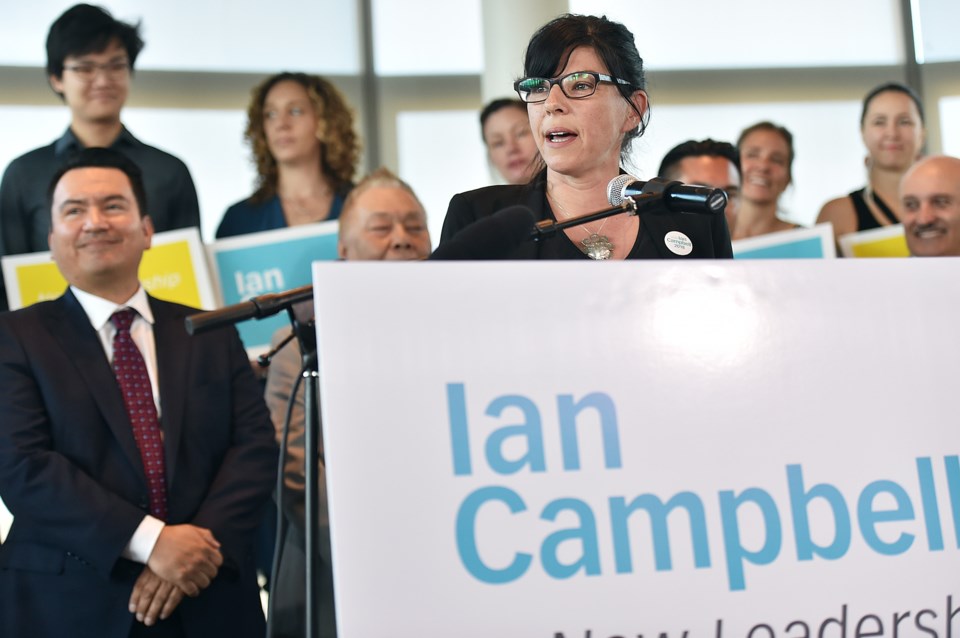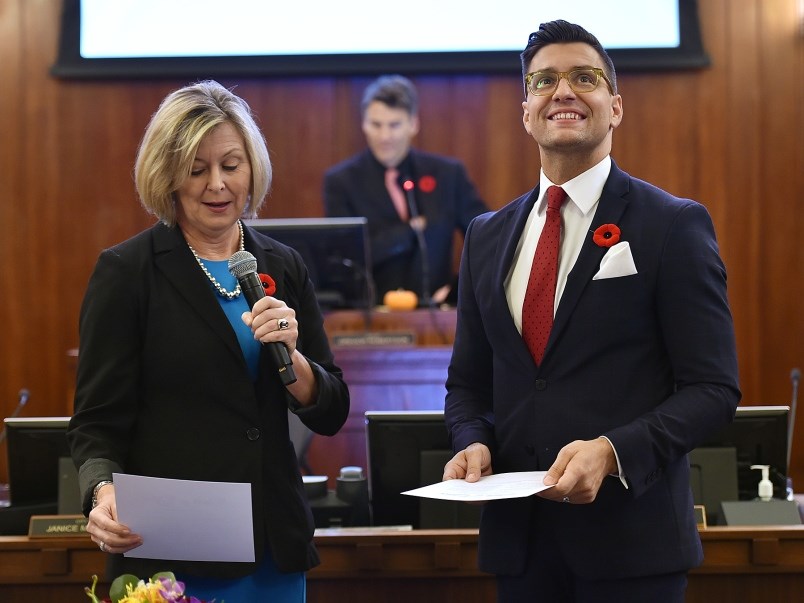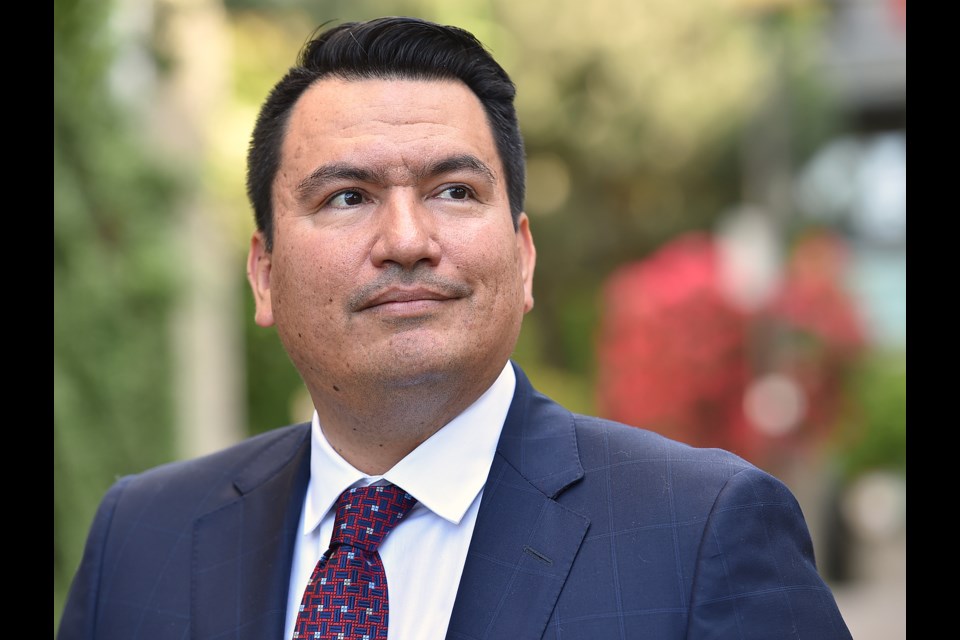So Ian Campbell wants to become Vancouver’s next mayor.
One of 16 hereditary chiefs with the Squamish Nation and a band councillor, he’s also been a key negotiator in getting his community to work with the Musqueam and Tsleil-Waututh nations to reclaim more than 120 acres of land in Vancouver.
The properties include the 90-acre Jericho lands, the 21-acre Heather Street lands near Queen Elizabeth Park and the 10-acre Liquor Distribution Branch warehouse property on East Broadway, which is co-owned with the Aquilini Investment Group.
Once redeveloped, the value of the properties is estimated to be in the billions of dollars.
The federal government’s commercial property arm, Canada Lands Company, holds an equal interest in the Heather Street lands and 52 acres of the Jericho lands; the remaining 38 acres of Jericho is owned by the bands.
To oversee development, the three nations founded the MST Development Corporation, which is also responsible for steering development of another 40 acres of land in West Vancouver and in Burnaby, which also involves Canada Lands Company and the Aquilini Investment Group.
That’s a total of about 160 acres in Metro Vancouver.
Name me another local entity that has that much developable land.
The Squamish also fully owns an 11-acre property that runs under the south side of the Burrard Bridge, which is not under the portfolio of the MST Development Corporation but is slated for redevelopment at some point in the future.
Campbell’s nation reclaimed the land in 2003 after lengthy court battles. He mentioned the property in his launch for mayor Monday, noting it was once the site of a Squamish village until government burned it to the ground in 1913.
It’s all this property and Campbell’s connection to it as a director of the MST Development Corporation that has people talking about what the chief’s role will be if Vision Vancouver members choose him to be their mayoral candidate and he is later elected mayor.
Some big “ifs” there, but worth exploring.
I asked Campbell about this relationship with the MST at his launch Monday.
“I recognize that my role as one of the negotiators and my involvement with the MST would put me in a conflict of interest, so I would be more than happy to look at how I would step back from those responsibilities,” he said.
So that’s pretty clear.
What Campbell has also made clear with me in previous interviews is how big of a deal it is for three nations to work together to develop land in Vancouver, despite the cost to buy back property on territory officially acknowledged by city government as unceded.
“We want to be inclusive and participate in regulatory processes, but we also need to balance that to show that First Nations bring something substantive to the table,” he said on a sunny summer day in June 2016 while sitting on a bench on the edge of the nation’s land under the Burrard Bridge. “So we’re creating a future, I believe, that is very exciting for transforming the city.”
Added Campbell: “The value of these lands has become a topic of interest for many people. Of course, there’re a lot of preconceived images [of what we’ll do with the land]. People don’t know who First Nations are, they don’t know our story, they don’t know the history and breadth of the contributions we’ve made to build this city because we’ve been marginalized deliberately by various levels of government over the last 150 years.”
Coincidentally, the day after Campbell’s launch, city council adopted the Heather Street lands “policy statement,” which is essentially a guide for future development on the property owned by the three nations and the Canada Lands Company.
The plan is to have more than 2,300 new homes for “mixed incomes, ages and cultures, including social, affordable and family housing,” according to a news release the city issued after council’s unanimous vote.
At least 20 per cent of the homes will be social housing and an additional 20 per cent “targeted for more affordable, attainable home ownership,” the release said.

Vision’s Andrea Reimer was one of the city councillors who unanimously adopted the policy statement. She also happens to be Campbell’s co-chairperson in his campaign.
Any conflict there?
Before I get to Reimer’s answer, I want to let you know the NPA’s Hector Bremner also voted to adopt the Heather Lands policy statement. Bremner, who is seeking re-election, happens to have aligned himself with Wade Grant of the Musqueam Indian Band, who declared he was seeking a council nomination with the NPA.
So any conflict there?
I’ll begin with Reimer’s response, which came via email.
“On the Heather Lands, no I am not in a conflict and I don’t really understand how it could even be perceived as a conflict,” she wrote. “For the one partner, MST, I have no direct or indirect financial interest in any of the three local First Nations which collectively own MST.”
She continued:
“For the other partner, Canada Lands Corporation, I guess you could argue that you and I are both in conflict as CLC is collectively held by all Canadians. But when a conflict is held in common with all, it’s not a conflict as you may know. I do have a long history of fighting for justice and economic reconciliation but that would be values-driven leadership as opposed to a conflict.”
She ended with:
“I find it frustrating that possible conflicts are going by unchallenged but when Indigenous people own lands collectively it becomes an issue. At the same time, it does speak to me of the need to break through that barrier, and one of the reasons I see the necessity of Ian’s campaign to break it.”

Bremner thought it was stretch to link his vote to Grant and the Musqueam. His vote also came a couple of weeks after learning he is no longer in the running to become the NPA’s mayoral candidate. As a result, Grant is mulling whether he will continue his campaign.
The NPA hasn’t publicly revealed why Bremner didn’t get the nod, but allegations have been swirling for weeks about Bremner’s perceived conflicts of interest related to his work in public affairs and as a former lobbyist; he has denied all claims, calling it a smear campaign by other party members.
“I don’t see how I could possibly be in a conflict in that,” Bremner said by telephone when asked about his vote on the Heather Street lands. “I don’t have an official role in [Wade’s]campaign, he doesn’t have an official role in mine.”
Added Bremner: “The first step to reconciliation is going to be economic reconciliation and parity with the nations and the mainstream economy. I’m glad we had unanimous support for [the policy statement].”
Campbell, meanwhile, still has to win Vision’s June 24 mayoral nomination contest. As I reported Monday, he’ll face tech entrepreneur Taleeb Noormohamed, who is expected to make his mayoral bid official May 23 at an event in Gastown.
@Howellings



